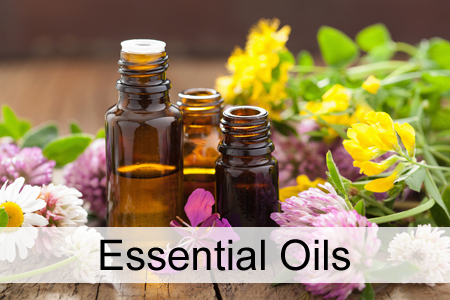
This is a find out everything you would want to know about essential oils guide with our beginners guide to essential oils for healing & pampering. Plus a step-by-step essential oil usage guide for many more aromatherapy uses - these oils are precious, and sweet smelling oils that are extracted from many different variety's of plants. It is thought, essential oils are generally used far more widely than is generally known. Essential oils can be found in lots of perfumes, medications and beauty products, and can also be found in some commercially prepared food and drinks.
The essential oils uses can have many therapeutic benefits for use in beauty, general well being, certain illness and general emotional health. Aromatherapy treatments using essential oils have gained popularity in recent years as an effective, natural way of easing stress and the relief essential oils can bring to your life. Essential oils and aromatherapy can help with a pressured life style, and with certain essential oils, either applied in the bath, massage, or in an oil burner, can help people to relax and fell more confident.
The essential oils uses can have many therapeutic benefits for use in beauty, general well being, certain illness and general emotional health. Aromatherapy treatments using essential oils have gained popularity in recent years as an effective, natural way of easing stress and the relief essential oils can bring to your life. Essential oils and aromatherapy can help with a pressured life style, and with certain essential oils, either applied in the bath, massage, or in an oil burner, can help people to relax and fell more confident.
Beginners guide to essential oils
Are you new to essential oils? Are you keen to get started but don’t know where to begin? Our beginners guide to essential oils is a great place to start.
Here we have answered the most common questions asked about essential oils and their uses so that you can use this information and get started on your essential oil journey.
What is an essential oil?
An essential oil is a concentrated organic compound, extracted from plants, usually obtained by a steam or water distillation process, but can also be gotten from a more mechanical process called cold pressing.
The compound extracted will keep the fragrance, properties and even the flavour of the plant that has been distilled. Leaving behind a very potent compound which we call essential oils.
Several different parts of the same plant can be used to make different essential oils which is why there is such a wide range of oils available.
The essential oil is then bottled and packaged ready to be sold. They are usually available to buy in bottles that range from 5ml to 100ml depending on the oil.
Is 5ml going to be enough?
Remember that an essential oil is a very potent extract.
It can take 242,000 rose petals to make just 5ml of rose essential oil, 3lb of lavender flowers to create a 15ml bottle of lavender essential oil and up to 50 lemons to make 15ml of lemon essential oil.
You won’t need more than a few drops to produce a powerful scent.
What is the difference between a pure essential oil and an essential oil essential oil blend?
A pure essential oil is also known as a true essential oil, is the concentrated plant extract without any added fragrance or oil.
An essential oil blend is usually a combination of complementing essential oils mixed together to combine the properties or scents of several oils.
How to use essential oils?
There are many ways to use an essential oil, and the methods vary depending on how you want to use them.
For instance, the way you would use an essential oil for the skin is different to how you would use them when using them to fragrance a bath bomb or perfume.
How do you use essential oils on the skin?
Essential oils shouldn’t be used directly on the skin. As they are a concentrated extract, most oils, if used neat on the skin would cause a reaction, even a small one would be an irritation if worn on the skin all day. Which is why when using an essential oil on the skin or for aromatherapy, the essential oil use are mixed with a carrier oil or base oil.
What is a carrier oil?
Carrier oils are natural cold pressed vegetable oils taken from the seeds, nuts or kernels of a plant. They are used to ‘carry’ the essential oil to the skin without losing the scent or the properties of the essential oil.
Most are odourless although some may have a slightly nutty scent to them depending on which carrier oil is used.
The most common carrier oils are;
Sweet Almond Carrier Oil
Coconut Carrier Oil
Evening Primrose Carrier Oil
Jojoba Carrier Oil
Sweet Almond Oil
Grapeseed Carrier Oil
Although there is a wide range of carrier oils available, some even having properties beneficial to the skin themselves.
What can I use Essential Oils for?
Essential Oils have been used for over three thousand years, in many different countries and cultures. These days, the uses of essential oils haven’t changed all that much except they are much more accessible, giving you the opportunity to benefit from them yourself.
The most common use of Essential Oils is for aromatherapy, and in the form of body massages. Aromatherapy is the practice of using essential oils to help treat and balance you mentally and physically.
You can use Essential Oils in your bath, although you must be careful not to slip, as the essential oils can make a tub ‘oily’ You only need a couple of essential oil drop added to the bathtub to benefit.
organic essential oils added to water and then bottled in a garden spray bottle can be used as natural room fresheners or as scented ironing water.
Certain essential oils can be used to aid relaxation or to help tired muscles, either in a muscle rub or used in a warm bath.
You can also use certain oils or a blend to aid you in a restful night’s sleep or to keep a cold or stuffy nose at bay.
Non-chemical cleaning products can be made with essential oils, and even a couple of drops of orange essential oil on a rag can help clean tough stains.
You can make perfumes or aftershaves for men, and there is a wide range of scents available for both men and women.
You can also use essential oils to make homemade bath and beauty products, including lotions, bath bombs and shampoo.
There are a wide range of benefits and uses for essential oils, and more are being found on a regular basis.
Basic Essential Oils To Start With
There are over 90 essential oils available, each with unique scents and properties. When starting out, it’s best to stick with the most common essential oils as they are usually the most tried and tested and can be a little easier to work with, especially scent wise.
The most common, or frequently talked about essential oils, and some of their uses are;
Lavender: Can be used in lotions, to soothe minor burns, as a relaxing muscle rub, or to aid with sleeping.
Sweet Orange: Can be used in lotions, as a cleaning product or as a relaxing muscle rub.
Tea Tree Oil: Can be added to lotions to help treat skin complaints or added to shampoo to help clear lice or dandruff.
Peppermint essential oil: Can be used to treat headaches, as a muscle rub and it also has a cooling effect.
Lemon: Can be added to bath products, as a cleaning product or to repel insects.
Eucalyptus essential oil: Can be used to treat colds, added to a warm bath to ease muscle complaints, or added to water to make a room spray.
Can I use essential oils while pregnant?
There are many oils that are safe to use when pregnant if you are very careful, but more importantly, there are some that should not be used at all. They are the following essential oils:
Eucalyptus essential oil
Cinnamon essential oil,
Clary Sage essential oil
Cypress essential oil
Fennel essential oil
Jasmine essential oil
Juniper Berry essential oil
Lavender
Marjoram essential oil
Myrrh essential oil
Origanum
Pennyroyal
Peppermint
Rose essential oil
Rosemary essential oil
Sage essential oil
Thyme essential oil
If you are in doubt, it is always best to not use any essential oils while pregnant.
When else shouldn’t I use essential oils?
If you have any medical complaints, it is always best to check if an essential should be avoided. A more detailed web search or a qualified aromatherapist would be able to tell you which oils shouldn’t be used for a severe medical issue.
For example, if you have high blood pressure you shouldn’t use the following essential oils:
Cypress
Eucalyptus
Ginger essential oil
Rose
Rosemary
Sage
Thyme
Are there any essential oils I can’t use on the skin?
Yes, there are essential oils that shouldn’t be used on the skin or for any other form of therapy. A fully qualified aromatherapist will be able to tell you in more detail which oils to steer clear from.
Here are a few examples:
Bitter Almond
Boldo Leaf
Calamus
Camphor essential oil
Cassia essential oil
Clove essential oil
Dwarf Pine
Horseradish
Jaborandi leaf
Mugwort
Wintergreen essential oil
Wormwood
Can children use essential oils?
This depends on the method of use and the age of the child. Like most medicine, children over the age of 12 can use essential oils as an adult would, and again, babies under 6 months shouldn’t have any essential oils applied on them. When it comes to young children, it is best to remember that they have delicate skin and are very sensitive to smell, try and cook Brussel sprouts without them complaining, so try and not use any oils on the skin or any strong-smelling oils.
If oils are being used on the skin, only use 1-2 drops of oil in a gentle carrier oil. Chamomile essential oil and lavender are good first oils to use if you choose to use any. Also Lavender & chamomile essential oil blend is also ready mixed.
A couple of drops of lavender left to dry on a pillow at night-time is a tried and tested sleeping aid for many parents.
Do you have any tips for buying essential oils?
Make sure to buy your essential oils from a reputable website or shop. A good site will have a wide range of information available for you about each essential oil, including the Latin name of the oil, which part of the plant the oil is distilled from and how to use the oil itself.
So, there you have the most common essential oil questions answered for you, we hope you enjoyed reading our guide and that you feel ready to start your trip into the world of essential oils.


